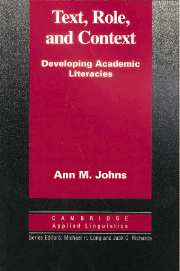Book contents
- Frontmatter
- Contents
- Series editors' preface
- Preface
- Acknowledgments
- 1 Literacy and pedagogy: Three views
- 2 Genre knowledge and socioliteracies: What readers and writers may share
- 3 Genre and social forces: “Homely” and academic texts
- 4 Discourse communities and communities of practice: Membership, conflict, and diversity
- 5 Special roles: Literacy practitioners as campus mediators and researchers
- 6 Students as researchers: Investigating texts, processes, and contexts
- 7 The socioliterate classroom: Basic tenets and goals
- 8 Putting tenets and goals into practice: Using portfolios in literacy classrooms
- 9 Conclusion
- References
- Index
2 - Genre knowledge and socioliteracies: What readers and writers may share
Published online by Cambridge University Press: 05 October 2012
- Frontmatter
- Contents
- Series editors' preface
- Preface
- Acknowledgments
- 1 Literacy and pedagogy: Three views
- 2 Genre knowledge and socioliteracies: What readers and writers may share
- 3 Genre and social forces: “Homely” and academic texts
- 4 Discourse communities and communities of practice: Membership, conflict, and diversity
- 5 Special roles: Literacy practitioners as campus mediators and researchers
- 6 Students as researchers: Investigating texts, processes, and contexts
- 7 The socioliterate classroom: Basic tenets and goals
- 8 Putting tenets and goals into practice: Using portfolios in literacy classrooms
- 9 Conclusion
- References
- Index
Summary
Every time a student sits down to write for us, he has to invent the university for the occasion – invent the university, that is, or a branch of it, like History or Economics, or Anthropology or English. He has to learn to speak our language, to speak as we do, to try on the particular ways of knowing, selecting, evaluating, reporting, concluding and arguing that define the discourse of our community. Or perhaps I should say the various discourses of our community, since … a student … must work within fields where the rules governing the presentation of examples or the development of an argument are both distinct, and even to the professional, mysterious (Bartholomae, 1985, p. 134).
This comment from a famous essay on academic literacy underscores for us the dilemma faced by students when they attempt reading, writing, and other tasks within a variety of academic contexts. As their literacy instructors, we must ask: “What is our role in helping students to solve academic ‘mysteries’? What can we do to make students' academic literacy tasks more manageable? How can we assist them to ‘invent’ a text in a manner that is appropriate and personally satisfactory in academic contexts?”
Throughout this volume, I argue that we can prepare students for approaching challenging academic texts and tasks by asking them to review what they already know and to assess current rhetorical situations in light of that knowledge.
- Type
- Chapter
- Information
- Text, Role and ContextDeveloping Academic Literacies, pp. 20 - 37Publisher: Cambridge University PressPrint publication year: 1997

